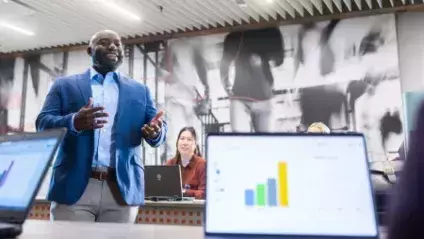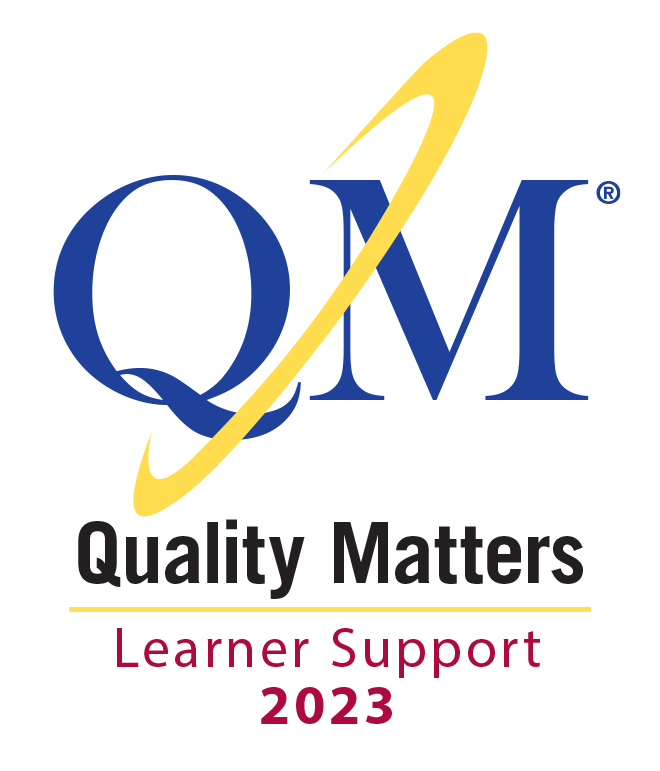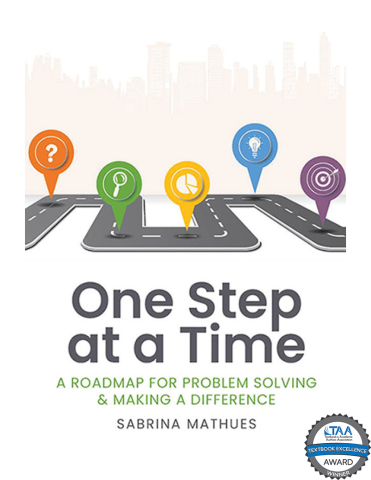Questions? Request Information
Protect Organizations from Cyber Threats
The threats of cybercrime, data breaches, and identity theft are challenges that have become all too common in modern society. Lead the charge to repel these threats when you earn your Bachelor of Science in Cyber and Data Security Technology from the University of Arizona Global Campus.
In this program, you’ll build your knowledge in cyber and data security technology, gain the opportunity to become a data security partner for businesses of all sizes, and learn how to harness technology to prevent 21st century crime with our online cyber and data security classes.
Your online cyber and data security technology degree was built on the principles of domestic and international information security. This online cybersecurity degree will teach you how to become a cybersecurity and data security professional who can support both government and industry to protect the information systems of the organization.
When you graduate from this program, you’ll be able to:
- Analyze a complex computing problem and apply principles of computing and other relevant disciplines to identify solutions
- Design, implement, and evaluate a computing-based solution to meet a given set of computing requirements in the context of the program’s discipline
- Communicate effectively in a variety of professional contexts
- Recognize professional responsibilities and make informed judgments in computing practice based on legal and ethical principles
- Function effectively as a member or leader of a team engaged in activities appropriate to the program’s discipline
- Apply security principles and practices to maintain operations in the presence of risks and threats
UAGC Award-Winning Curriculum
Military Students $250.00/credit
Undergraduate Courses $460.00/credit
Technology Fee** $115.00/course
Books and Other Class Materials** $125.00/average per course
Graduation Fee $150.00
Total Program Cost See UAGC Catalog¹
¹Keep in mind that this figure doesn’t factor in any potential discounts, partner benefits, or impact of accepted transfer credits, if eligible.

UAGC offers enrolled students access to ScholarshipUniverse, a platform that tailors external scholarship opportunities to your unique situation, making it easier to find and apply for scholarships.
UAGC is proud to provide reduced tuition rates for our academic and corporate partners, helping community college transfer students and corporate employees earn their degrees at a lower cost.


Course Overview
To earn your Bachelor of Science in Cyber & Data Security Technology at the University of Arizona Global Campus, you must complete 120 credits. You will need to complete 30 upper-division credits, of which 18 credits must be from the major program. A total of 30 credits must be completed at Global Campus to meet the residency requirement. You may be able to transfer approved credits from community colleges, other previous college coursework, or other life experiences such as military service or job training toward your degree.
Program Specific Requirements:
- Platforms: The most currently commercially available version of the Windows operating system (as of August 2024 this is Windows 10 or higher) or macOS (as of August 2024 this is macOS 14.5). Note: The most current version of the Windows operating system is the recommended platform.
- Administrative Rights: Students must obtain administrative rights to their computer and Internet connection. The ability to download and upload files from various sources and providers will be required. Students must have administrative rights to their computers to facilitate the following:
- Software Installation: Many TEC courses require the installation of specialized software, including development environments, programming languages, and database management systems.
- File Management: The ability to manage files such as downloading, uploading, and modifying files from various sources.
Our mission is to equip students with advanced knowledge and practical skills in cyber defense to protect digital assets and information in a rapidly evolving technological landscape. We are committed to creating a rigorous academic environment that emphasizes critical thinking, ethical practices, and hands-on experience. Our program prepares graduates to become innovative leaders and effective problem-solvers in cybersecurity, strengthening the security and resilience of digital infrastructures worldwide.
The Bachelor of Science in Cyber and Data Security Technology program at the University of Arizona Global Campus expects graduates within a few years of graduation to attain the following:
- Address the challenges of the rapidly changing cyber security technology, ethically and responsibly.
- Exceed the increasing expectations of employers in solving complex problems in cyber security.
- Attain industry required skills for technical, supervisory and management positions.
- Gain leadership positions in the cyber security industry, academe, and government.
Graduates of the program will have an ability to:
- Analyze a complex computing problem and apply principles of computing and other relevant disciplines to identify solutions.
- Design, implement, and evaluate a computing-based solution to meet a given set of computing requirements in the context of the program’s discipline.
- Communicate effectively in a variety of professional contexts.
- Recognize professional responsibilities and make informed judgments in computing practice based on legal and ethical principles.
- Function effectively as a member or leader of a team engaged in activities appropriate to the program’s discipline.
- Apply security principles and practices to maintain operations in the presence of risks and threats.
UAGC OIE can provide the IPEDS Enrollment and Graduation Data.
This program is not designed to meet the state educational requirements for a specific professional license or certification in any state. Students seeking licensure or certification in a particular profession shall carefully research the requirements prior to enrollment and regularly review the requirements as they are subject to change. Requirements vary by state. The University of Arizona Global Campus does not guarantee that any professional organization will accept a graduate’s application to sit for any exam for the purpose of professional certification. Further, a criminal record may prevent an applicant from obtaining licensure, certification, or employment in their field of study.
Certain degree programs may not be available in all states.
The Online Teaching Support Certification recognizes programs that require all online faculty to undergo training in best practices for online course delivery, provide faculty with ongoing pedagogical support, encourage faculty professional development to increase their knowledge and skill in online teaching, emphasize instructor availability and feedback to learners, and collect and use feedback from learners to improve online teaching. Learn More

The Online Learner Support Certification recognizes programs that provide all the critical student and academic services needed for learner success and use learner feedback to continuously improve those services.

What Can I Do with a Degree in Cyber and Data Security Technology?
As a graduate of this program, there are many types of cybersecurity jobs you could pursue, including:
- Information Security Specialist
- Information Systems Security Analyst
- Information Technology Security Analyst (IT Security Analyst)
- Security Analyst
- Systems Analyst
- Information Technology Specialist (IT Specialist)
- Forensics Analyst
- Information Security Officer
- Penetration Tester
- Information Security Analyst
- Security Manager Specialist
- Security Manager
As reports of cyberattacks on businesses have become more frequent in recent years, the need for data security professionals has grown. Your Bachelor of Science in Cyber and Data Security Technology degree will provide you with the knowledge to help organizations in many industries protect their data.
Gain insights into the cybersecurity and data security job market by reviewing the Bureau of Labor Statistics market outlook report.
The ability to work towards my degree and maintain my daily life was a huge factor in my decision to go back.
BS in Cyber and Data Security Technology FAQs
-
A Cyber and Data Security Technology degree prepares graduates for a wide range of in-demand cybersecurity roles. Graduates can pursue work as analysts, IT specialists, and more. The degree provides the necessary skills to protect networks, systems, and data from cyber threats, making it a valuable asset in today's digital age.
-
At UAGC, your core coursework in the cyber and data security technology bachelor’s degree focuses on fundamental knowledge of the technology associated with computing, software, and information technology, as well as relevant business topics such as project management and technical writing. Your major course requirements will develop your cyber and data security skills to protect systems, web apps, social networking sites, and more.
-
Certifications may enhance your job prospects. While not always strictly required, certifications validate your skills and knowledge, making you more attractive to employers. Common certifications include CompTIA Security+, CISSP, and CEH.
-
The increasing quality and accessibility of online education have significantly reduced the stigma associated with online degrees. According to U.S. News & World Report, many employers now recognize the value of online programs, especially from accredited universities like UAGC.
-
While in most online programs, you would need basic computer skills, reliable internet access, and a compatible device (laptop or desktop computer) to be successful in your program, because of the technical aspect of the UAGC cyber and data security technology program, you will also need the most currently commercially available version of the Windows operating system or macOS, as well as administrative rights to your computer and internet connection. Additional details regarding technology requirements can be found in the UAGC Academic Catalog.
See What Else UAGC Has to Offer
Questions? Request More Information
To access this rate using the Liberty Grant, only eligible undergraduate active duty service members, members of the National Guard, Reservists, spouses of active duty, members of the National Guard and Reservists, Department of Defense employees using Tuition Assistance (TA), and civilian employees of the United States Coast Guard (only if utilizing Military Tuition Assistance) will qualify.
**
The Technology Fee covers access to University systems such as the online classroom, the Student Portal, and other academic resources. The Technology Fee and the Course Digital Materials (CDM) Fee are fully refundable if a student does not attend beyond Day 3 of a course (Week 3 if covered under the University of Arizona Global Campus Promise Refund Schedule). After this time, the fee becomes non-refundable. Students are charged the Technology Fee for repeated coursework. Students are not charged the CDM fee for repeated coursework if previously charged.
†
The transferability of credits is subject to the University of Arizona Global Campus transfer credit policies and requires the submission of official transcripts. The official transcripts will be evaluated by the Registrar’s Office to determine the credits that will officially apply toward a UAGC degree program. Credits must be earned at the same degree level in order to be applied. Additional restrictions may apply. See the UAGC Academic Catalog for full undergraduate and graduate transfer policies.





